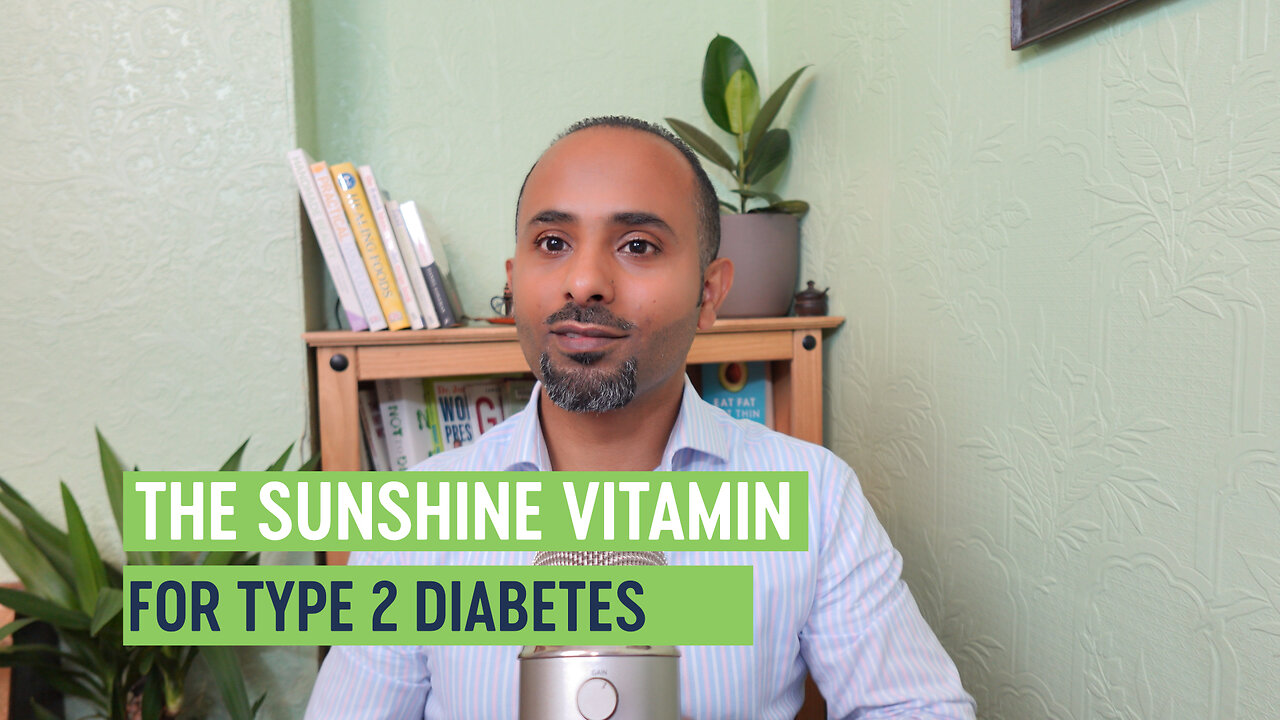Premium Only Content

Harnessing the Power of Vitamin D for Type 2 Diabetes
https://www.wellnessimpact.org
Today I’m diving into a crucial topic for those managing type 2 diabetes: Vitamin D. In this video, I will explore the role of Vitamin D in diabetes management and share some tips on how to optimise your levels naturally.
First, let's understand why Vitamin D is essential for people with type 2 diabetes. Vitamin D is not just a regular vitamin; it's a vital hormone in various physical functions. It helps regulate insulin production, improves insulin sensitivity, and enhances glucose metabolism.
Research suggests that people with type 2 diabetes often have lower levels of Vitamin D, which can contribute to higher blood sugar levels and insulin resistance. Therefore, optimising your Vitamin D levels can positively impact your diabetes control.
Now, you might be wondering, "How can I increase my Vitamin D levels naturally?" Well, here are some holistic approaches to consider:
1. The Sun: The most natural way to boost your Vitamin D levels is through sunlight exposure. Spend about 15-30 minutes outdoors, preferably during the early morning when the sun is less intense.
2. Combine Vitamin D-Rich Foods: Include foods high in Vitamin D in your diet. Some good sources include fatty fish like salmon and mackerel, dairy products, eggs (specifically the yolks), and mushrooms.
3. Supplements: You may consider Vitamin D supplements to ensure you're meeting your daily requirements. They come in various forms like Vitamin D3 and D2. Remember, it's important to discuss the amount you need with your medical doctor.
Beyond managing your Vitamin D levels, it's fundamental to maintain an overall healthy lifestyle to support your diabetes management. Here are a few additional tips:
2. Balanced Diet: Focus on a balanced and nutrient-rich diet consisting of whole grains, lean proteins, fruits, vegetables, and healthy fats. Limit or avoid foods that have added sugars or refined carbohydrates.
2. Regular Physical Activity: Engage in regular exercise, such as brisk walking, swimming, or cycling. Physical activity not only helps maintain a healthy weight but also improves insulin sensitivity and blood sugar control.
3. Stress Management: Chronic stress can negatively impact your blood sugar levels. Find stress-reducing techniques that work for you, such as meditation, deep breathing exercises, or engaging in hobbies you enjoy.
Remember, managing type 2 diabetes is a holistic journey. Optimising your Vitamin D levels is just one piece of the puzzle. It's crucial to work closely with a health professional or coach and incorporate these holistic approaches into your daily routine.
If you found this information helpful, please share this video with your friends and family who might benefit from it. Please subscribe to our channel and visit our website at wellnessimpact.org.
Diabetes Coaching: https://www.wellnessimpact.org/coaching/
Join the Facebook group: https://www.facebook.com/groups/wellnessimpact
-
 1:38:35
1:38:35
FreshandFit
10 hours agoDecoding Lily Phillips' Lies Through An RP Lense!
71.6K26 -
 1:39:03
1:39:03
Benny Johnson
10 hours ago🚨 Trump Live Right Now From Oval Office in First Fox News Interview as President | ‘Watch This…’
184K179 -
 2:10:04
2:10:04
Barry Cunningham
11 hours agoLIVE WATCH PARTY: PRESIDENT TRUMP INTERVIEW WITH SEAN HANNITY!
69.8K25 -
 1:37:19
1:37:19
Glenn Greenwald
14 hours agoAs Trump Vows to Restore Free Speech, Harvard Just Assaulted It; Columbia Professor Forced Out Over Israel Criticisms | SYSTEM UPDATE #394
107K204 -
 58:45
58:45
The StoneZONE with Roger Stone
11 hours agoTrump Pardons Ross Ulbricht | The StoneZONE w/ Roger Stone
80.1K17 -
 1:57:31
1:57:31
2 MIKES LIVE
20 hours ago2 MIKES LIVE #170 with special guest Rep. Buddy Carter (R-GA)
69.4K3 -
 1:02:58
1:02:58
Flyover Conservatives
1 day agoA Doctors Response to Trump’s First Moves: W.H.O. and FDA - Dr. Troy Spurrill; A REAL-LIFE Approach to Health and Wellness Transformation - Kellie Kuecha Moitt | FOC Show
135K9 -
 41:50
41:50
State of the Second Podcast
15 hours agoWhat do Gold and Guns have in common?
67.7K5 -
 1:01:26
1:01:26
PMG
11 hours ago $7.28 earnedLibs In FULL PANIC Since Trump Took Office! Creating a Faith to Fit their Agenda
48.9K10 -
 7:09:22
7:09:22
Dr Disrespect
19 hours ago🔴LIVE - DR DISRESPECT - TRIPLE THREAT CHALLENGE - EXTREME EDITION
274K39